Albon is a widely used medication for cats.
It is specifically effective against coccidia, a common parasitic infection. If your cat is diagnosed with coccidia or certain bacterial infections, Albon could be a key part of their treatment plan. Knowing how this medication works and its proper usage can make a significant difference in your pet’s health and recovery.
Veterinarians often prescribe Albon due to its effectiveness and manageable side effects when used appropriately.
Understanding the correct dosage and administration is crucial to ensure that your feline friend receives the best care possible.
By being informed, you can help monitor your cat for any reactions during their treatment.
Caring for a pet can come with its challenges, especially when it involves medication.
Having reliable information about Albon can ease some of the stress and uncertainty.
You will feel more equipped to support your cat’s treatment and overall well-being.
Key Takeaways
- Albon is effective for treating coccidia and certain bacterial infections in cats.
- Proper dosage and monitoring are essential for your cat’s safety.
- Understanding side effects can help ensure your pet’s recovery and comfort.
What Is Albon?
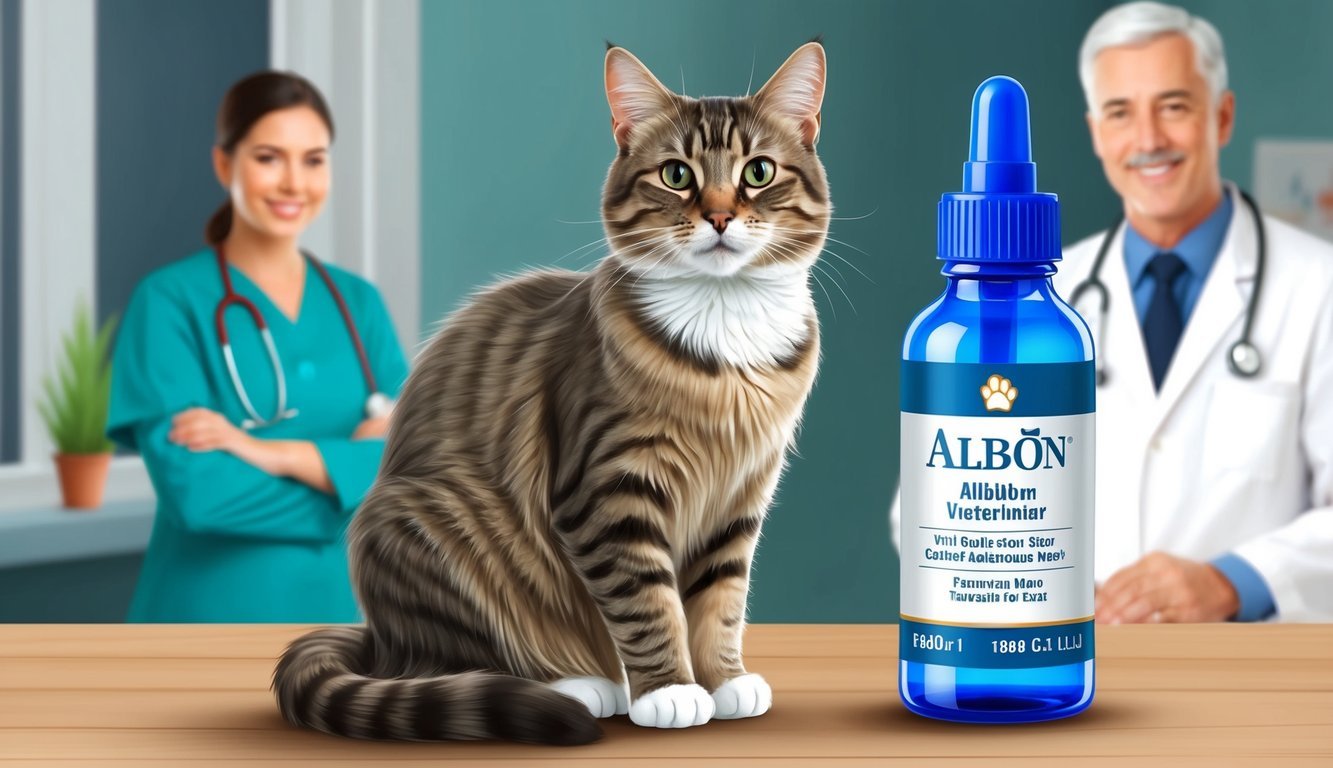
Albon is a veterinary medication primarily used to treat infections in cats.
Understanding its active ingredient and classification as a sulfonamide antibiotic can help you better manage your cat’s health.
Albon and Its Active Ingredient
Albon is the brand name for sulfadimethoxine, which is a sulfonamide antimicrobial agent.
This medication targets specific types of infections, particularly those caused by the coccidia parasites, which affect the gastrointestinal system of cats.
Sulfadimethoxine works by inhibiting bacterial growth, allowing your cat’s immune system to effectively combat the infection.
This drug is typically administered as a flavored oral liquid, making it more palatable for your cat.
It’s usually prescribed for a short duration, often around five days, to clear up infections effectively.
Albon as a Sulfonamide Antibiotic
As a sulfonamide antibiotic, Albon functions differently from traditional antibiotics.
It mainly targets protozoal infections, rather than bacterial ones, although it does have some broad-spectrum capabilities.
Sulfonamides, like sulfadimethoxine, interfere with the synthesis of folic acid in bacteria, hindering their ability to reproduce and survive.
This unique action makes Albon suitable for a variety of infections, particularly those linked to the coccidia family.
While sulfonamides are generally safe, it’s essential to follow your veterinarian’s guidance on dosage and duration of treatment to avoid potential side effects.
When to Use Albon for Cats
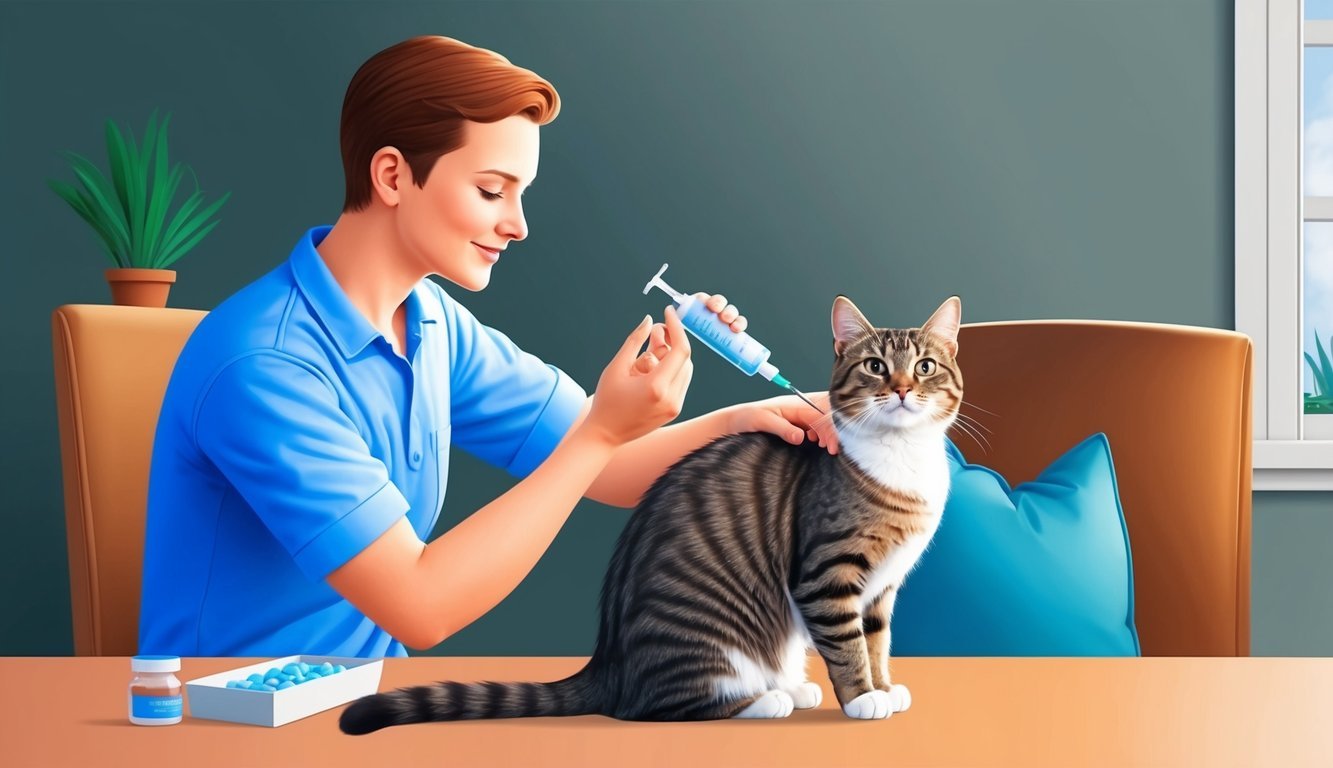
Albon is a veterinary medication primarily employed to treat specific infections in your cat.
Understanding when to use Albon can help ensure the health and well-being of your feline friend.
Coccidiosis Treatment
Coccidiosis is a parasitic infection that affects your cat’s intestines, often caused by coccidia.
Symptoms may include diarrhea, vomiting, and weight loss.
If you notice any of these signs, consulting your veterinarian is essential.
Albon, or sulfadimethoxine, is an effective treatment for coccidiosis.
The dosage is typically 55 mg per kg of your cat’s weight on the first day, followed by 27.5 mg per kg daily thereafter.
Treatment generally lasts up to five days, but your vet will adjust the duration based on your cat’s recovery.
Following your vet’s guidance is crucial to ensure complete eradication of the infection.
Monitor your cat for side effects, which can include lethargy or digestive upset, though these are uncommon.
Other Bacterial Infections
Albon is also used to treat other bacterial infections in cats.
It can be effective against respiratory infections and other conditions caused by various bacteria.
If your cat presents symptoms like coughing, nasal discharge, or fever, a visit to the veterinarian is warranted.
The veterinarian will determine whether Albon is suitable based on your cat’s specific infection and overall health.
The dosage may vary according to weight and severity, typically following a similar pattern as for coccidiosis.
Always follow the veterinarian’s instructions regarding dosage and duration of treatment.
Be attentive to any changes in your cat’s behavior or health during the course of treatment.
Benefits of Albon
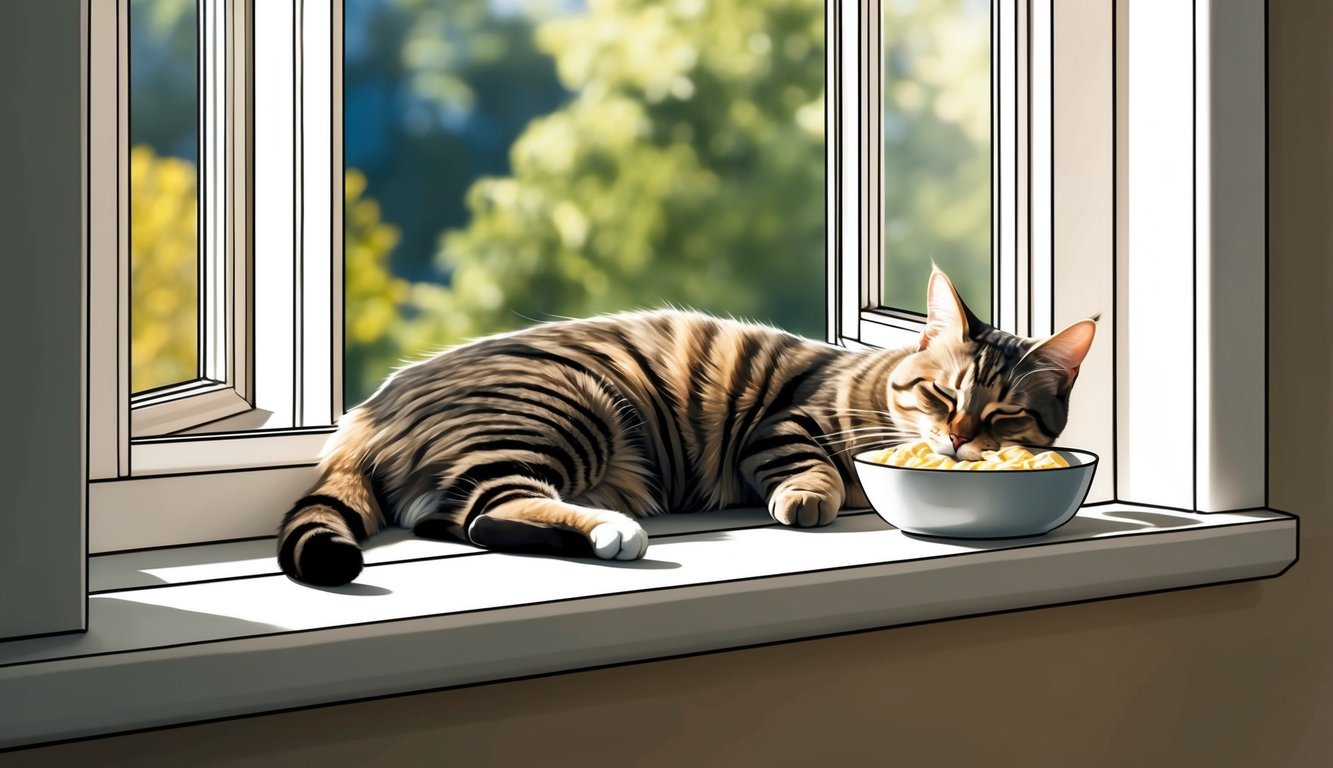
Albon offers significant advantages when treating various infections in cats.
Its effectiveness, particularly against protozoal organisms, contributes to its popularity among veterinarians.
Effectiveness Against Protozoal Organisms
Albon, known as sulfadimethoxine, is especially effective against protozoal organisms that cause gastrointestinal infections in cats, such as coccidia.
These microscopic organisms can lead to severe diarrhea, dehydration, and weight loss.
When your cat is infected with coccidia, Albon works by inhibiting the growth of these parasites.
It allows your cat’s immune system to combat the infection effectively.
In addition to gastrointestinal issues, Albon can also assist in managing respiratory infections related to certain protozoa.
This broad action against protozoal organisms makes Albon a versatile treatment option.
Always consult your veterinarian for the right dosage and length of treatment to ensure your cat receives optimal care.
Proper Dosage and Administration
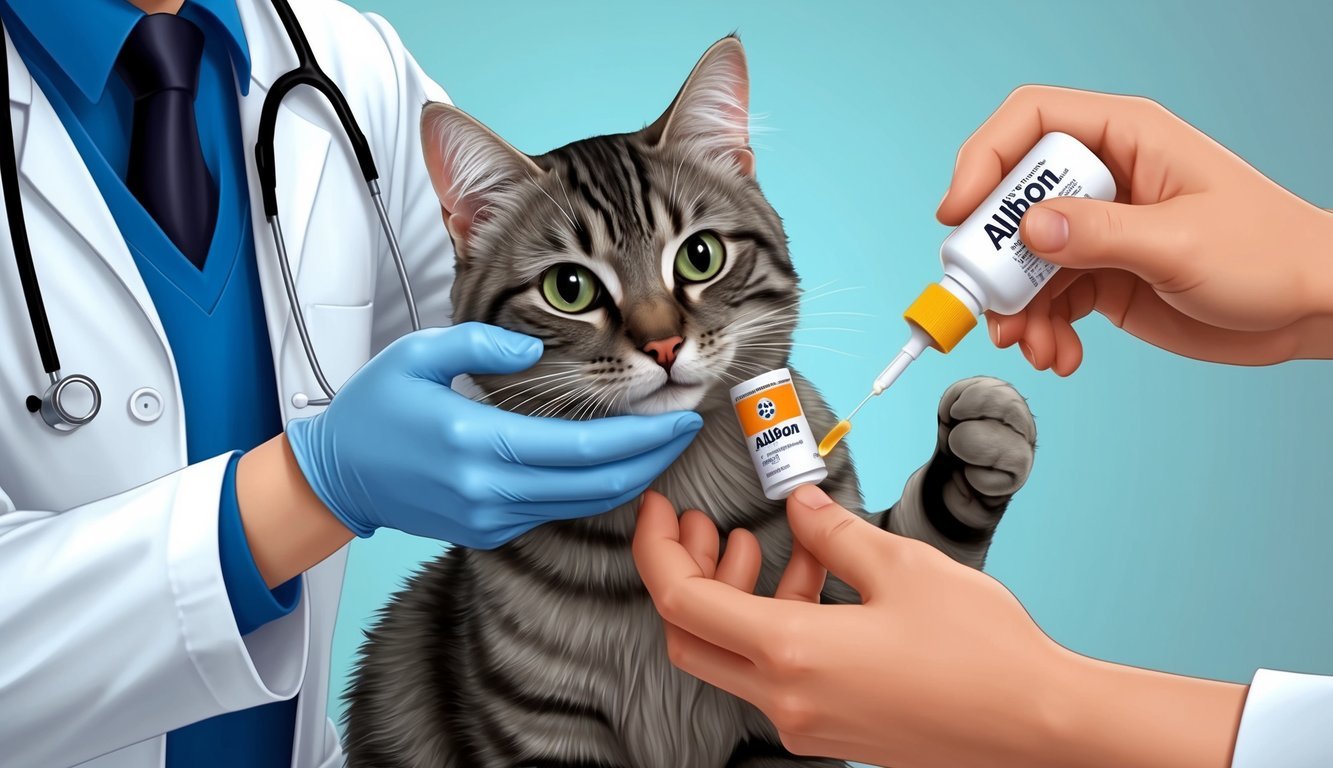
Getting the dosage and administration right for Albon is crucial for your cat’s health.
This section covers how to calculate the appropriate dosage and the different modes of administration available.
Calculating the Right Dosage
When determining the dosage for Albon, you’ll need to consider your cat’s weight.
The FDA recommends an initial dose of 55 mg per kg of body weight.
For ongoing treatment, the dosage is typically 27.5 mg per kg once daily.
It’s essential to consult your veterinarian for an appropriate recommendation tailored to your cat’s condition.
Example Dosage Calculation:
| Cat Weight (lbs) | Initial Dose (mg) | Daily Dose (mg) |
|---|---|---|
| 10 | 250 (55 mg/kg) | 125 (27.5 mg/kg) |
| 15 | 375 (55 mg/kg) | 187.5 (27.5 mg/kg) |
| 20 | 500 (55 mg/kg) | 250 (27.5 mg/kg) |
Always measure accurately to avoid underdosing or overdosing, which can lead to ineffective treatment or increased side effects.
Modes of Administration
Albon comes in different forms, mainly oral suspension and tablets.
The oral suspension is often more suitable for cats, as it can be easier to administer.
Typically, you would use a syringe for administering the liquid, ensuring your cat swallows it.
For the suspension, the recommended initial dose is 25 mg per lb, followed by a maintenance dose of 12.5 mg per lb.
On the other hand, tablets can be given directly or crushed and mixed with food.
If you opt for tablets, make sure your cat takes the full dose.
Whichever form you choose, follow your vet’s instructions closely to ensure your cat receives the correct amount of medication.
Potential Side Effects
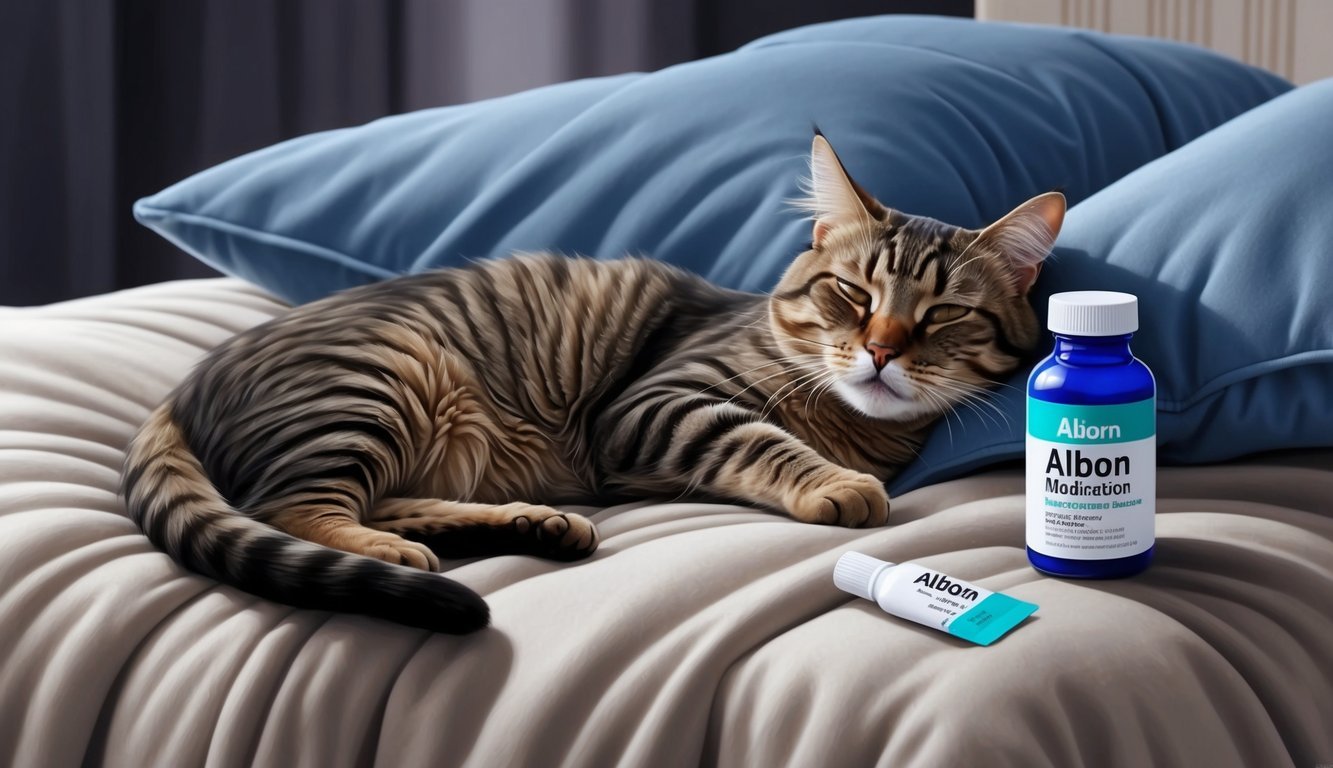
When using Albon for your cat, it’s essential to be aware of possible side effects.
While many cats tolerate the medication well, some might experience mild to moderate reactions.
Recognizing these early can help you ensure your pet’s comfort and health.
Common Side Effects
The most frequently reported side effects of Albon include:
- Vomiting: Your cat may vomit after taking the medication. This is generally mild but should be monitored.
- Diarrhea: Some cats can develop diarrhea, which may indicate a sensitivity to the medication.
- Loss of Appetite: A decreased appetite is common and may persist for a short duration.
In rare cases, cats can experience more severe reactions, such as allergic responses.
Symptoms like swelling, hives, or difficulty breathing warrant immediate veterinary attention.
Always keep an eye on your cat for any unusual behaviors following the administration of Albon.
Managing Side Effects
If your cat shows signs of side effects, here are a few management tips:
- Monitor Food Intake: Encourage your cat to eat by offering their favorite foods. This can help if they’re experiencing loss of appetite.
- Hydration is Key: Ensure your cat has access to fresh water. Diarrhea can lead to dehydration, so it’s crucial to keep them hydrated.
If vomiting or diarrhea persists for more than a day, contact your veterinarian.
They might suggest alternative medications or adjust the dosage.
Rarely, keratoconjunctivitis sicca (dry eye) may also be reported with prolonged use.
If you notice any eye irritation or unusual tearing, consult your vet for guidance.
Safety Information
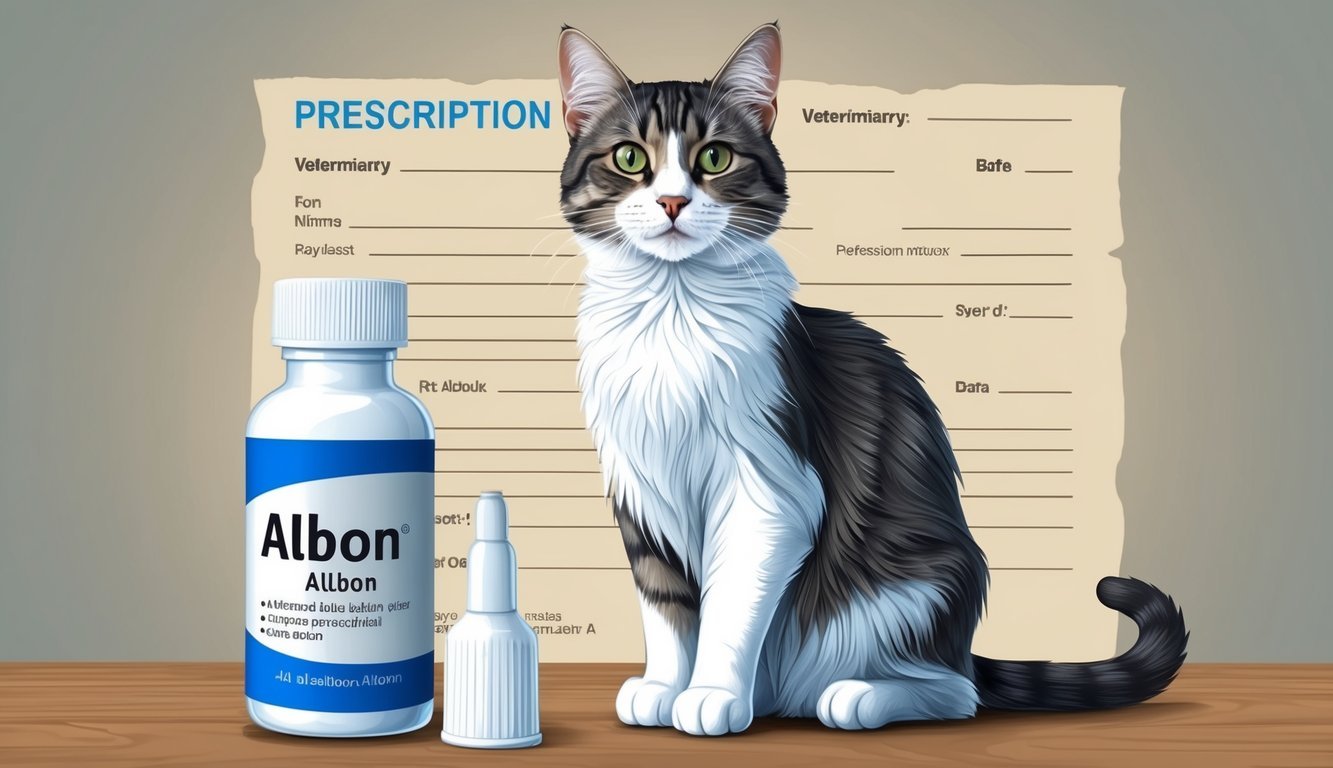
When considering Albon for your cat, it’s crucial to be aware of its safety profile.
There are specific contraindications and important considerations for potential drug interactions that you should keep in mind.
Contraindications and Precautions
Never use Albon in cats that have a known allergy to sulfadimethoxine or similar medications.
Allergic reactions can occur, leading to symptoms like itching, swelling, or difficulty breathing.
Cats with liver or kidney issues should also avoid this medication unless directed by a veterinarian.
Dosage adjustments may be necessary in these cases.
Monitor your cat during treatment for any signs of adverse effects.
Common concerns include gastrointestinal upset, such as vomiting or diarrhea.
If you notice unusual behavior or illness, consult your vet promptly.
Interactions With Other Medications
Albon can interact with certain medications, leading to complications.
Antacids, for example, can diminish Albon’s effectiveness if administered simultaneously.
It’s best to space these medications apart by at least two hours.
Additionally, take care when using Albon with other antibiotics.
Some combinations may lead to reduced efficacy or increased side effects.
Always inform your veterinarian about any other medications your cat is taking, including over-the-counter drugs and supplements.
This helps ensure your cat receives the safest, most effective treatment possible.
Monitoring and Care
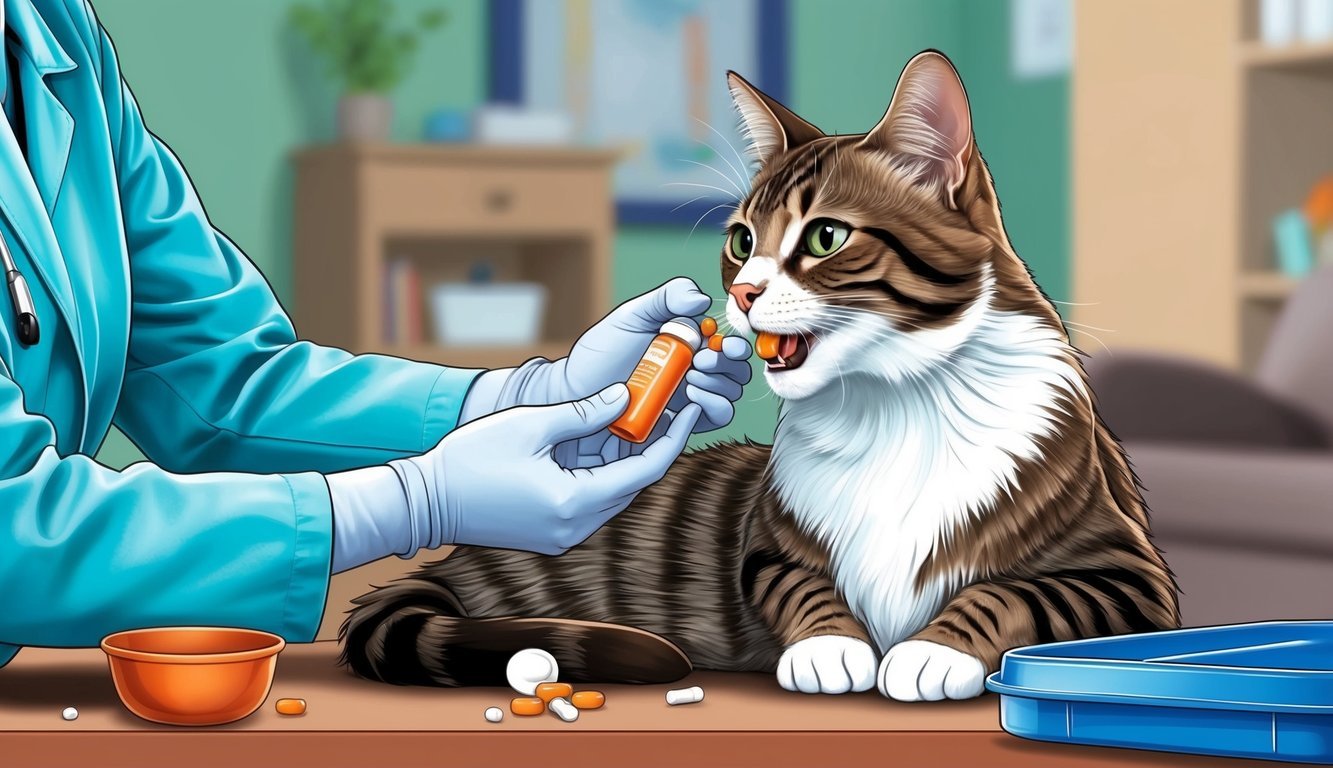
When your cat is on Albon, attentive monitoring is essential.
You need to be mindful of any signs of dehydration and changes in appetite, as these can indicate side effects or complications.
Regular veterinary follow-ups will also ensure your cat remains healthy throughout the treatment.
Dehydration and Appetite Changes
Be alert for signs of dehydration in your cat, including dry gums, lethargy, and reduced skin elasticity.
Dehydration can severely impact your cat’s health, so offering fresh water at all times is crucial.
Monitor your cat’s appetite closely.
Some cats may experience a decrease in appetite while on Albon.
If your cat refuses food for more than 24 hours or shows any other concerning symptoms, consult your veterinarian.
Document any changes, as this information will be helpful during vet visits.
Veterinary Follow-Up
Regular veterinary check-ins are vital when your cat is on Albon.
Your veterinarian will assess your cat’s response to the medication and check for any side effects.
Follow the vet’s recommendations regarding dosage and frequency.
Treatment duration may vary based on your cat’s condition, so be prepared for adjustments as needed.
Keep your vet informed about any noticeable changes in behavior, which can guide further treatment decisions.
Practical Considerations
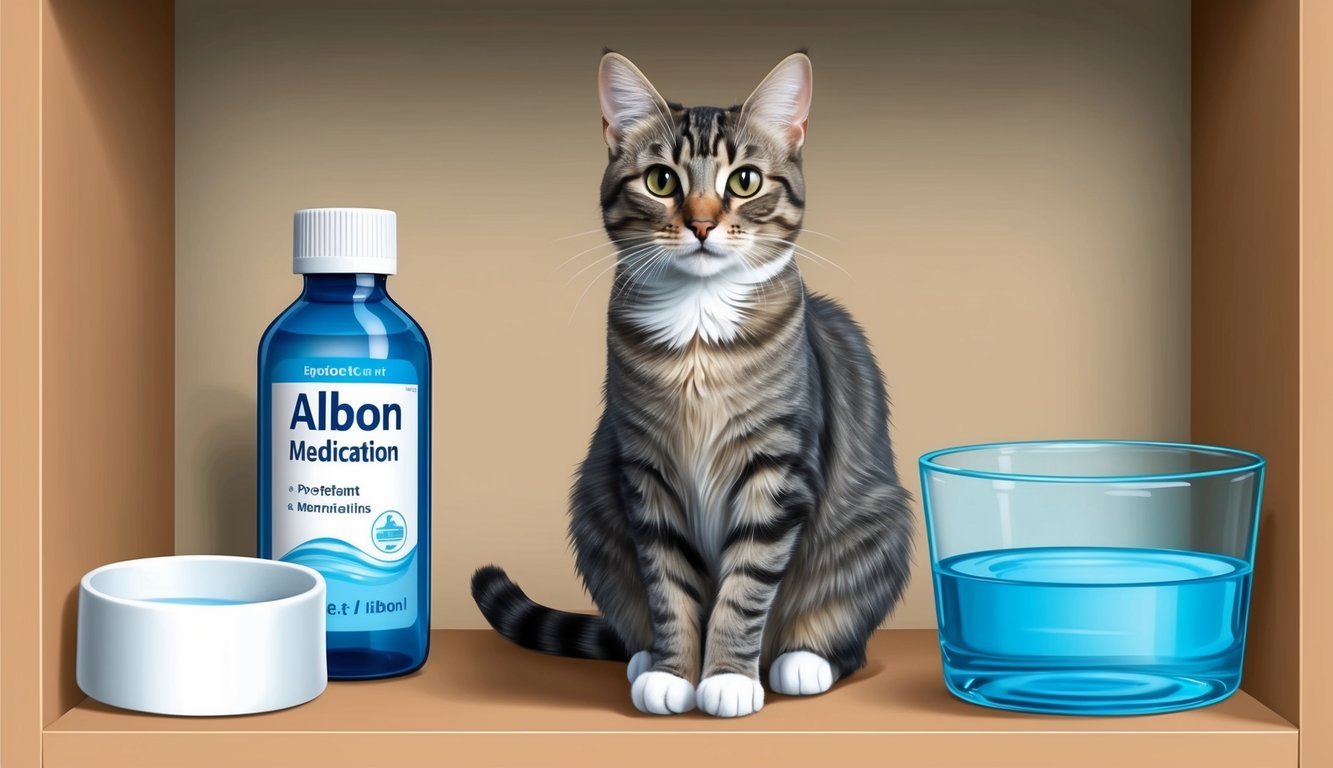
When using Albon for your cat, it’s essential to pay attention to how you store it and understand its availability.
By following specific guidelines, you can ensure its effectiveness and reliability when treating your feline friend.
Storage Recommendations
Maintaining Albon’s efficacy requires proper storage.
Keep the medication in its original container, tightly closed, and away from light.
A cool, dry place is ideal—avoid areas with high humidity, like bathrooms.
It’s important to check the expiration date before use.
If you have leftover Albon, dispose of it safely as per your veterinarian’s advice or local guidelines.
Managing your stock can prevent you from using expired medications that may not work effectively.
Availability and Branding
Zoetis, a well-known name in veterinary pharmacology, produces Albon.
It’s typically available in an oral suspension form, which is often custard-flavored to make it more palatable for cats.
You can find Albon at most veterinary clinics and pet pharmacies.
Availability may vary, so it’s wise to check with your vet or local pet store to ensure you can get the medication when needed.
Always consult your veterinarian for proper dosing and any additional questions regarding Albon.
Frequently Asked Questions
When it comes to using Albon for your cat, it’s normal to have questions.
Here’s a brief overview addressing common concerns about dosing, side effects, and administration of this medication.
How should Albon be dosed for cats?
Dosing Albon typically depends on your cat’s weight and the specific condition being treated.
Your veterinarian will provide the most accurate dosage instructions based on your cat’s individual needs.
What are the possible side effects when giving Albon to cats?
Common side effects can include loss of appetite, vomiting, and diarrhea.
Some cats may also experience allergic reactions, though these are less common.
Is there a dosage chart available for Albon when treating cats?
Yes, veterinarians often refer to dosage charts that take into account your cat’s weight and the condition being treated.
Always confirm with your veterinarian before following any chart.
Can Albon liquid be administered to cats and how?
Albon is available in liquid form, which can be administered using a syringe or dropper.
Make sure to follow your vet’s guidance on how to give it to ensure your cat receives the correct dosage.
How long does it typically take for Albon to start working in felines?
You may start to see improvement within a few days after administering Albon.
Full effects can vary depending on the infection, so regular monitoring is important.
For how long should Albon be given to cats to treat coccidia?
Veterinarians usually prescribe Albon for about 10 days, but this can vary.
Always follow your veterinarian’s instructions regarding the treatment length for your cat.

